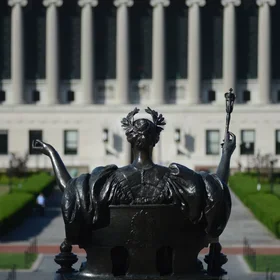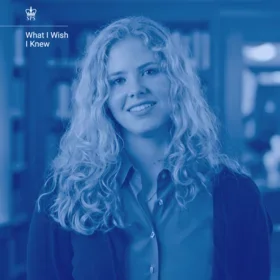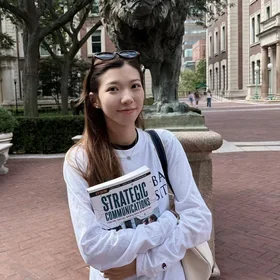Written by Leda Strong, M.S. in Sports Management student
Coming from the education space, I’ve had the privilege to hold the roles of teacher, basketball coach, tutor, community organizer, and most recently mentor to student athletes. Throughout my career in this field, I saw the many ways sports has the power to inspire, transform, and unite communities. After five years of watching students strive to follow the lead of Steph Curry or embody the on-and-off field resilience of the USWNT, I decided to shift gears and work inside the industry that touched and changed the lives of so many.
I decided to shift gears and work inside the industry that touched and changed the lives of so many.
Other than sporting a shade of blue extremely close to my beloved UNC-Chapel Hill, the most attractive aspects of Columbia were the world-class education I could receive and the ability to do so in the heart of New York City, a hub of national and global sports.
The fall semester was an incredible introduction to a career in sports, both through the quality of classroom instruction from professors like Len Elmore, Tom Richardson and Carla Varriale, and through the myriad networking opportunities and extracurricular events made possible by the program. I also jumped into a position in October with the student club SMAC (Sports Management Association of Columbia) as the Events Chair, and have thoroughly enjoyed my role facilitating gatherings and events (both in-person and virtual) that unite and celebrate our cohort. Yet I believe the strongest testament to my experience so far was the response to a very difficult spring semester, in which our country and world saw first a global pandemic and then a movement combating the systemic violence toward and oppression of Black people. Our cohort and our faculty responded with dedication to our continued education – both with regards to the sports industry and greater human rights issues – and an even stronger network of support for one another.
I feel empowered by our program’s faculty and fellow students to start necessary conversations, ask crucial questions, and advocate for justice in the sports industry and our greater communities.
I feel blessed to have come to the program from the education field, but as a result was lacking many hard skills and knowledge of industry and market trends. Through classes and my spring internship at Wasserman, a sports media agency to which the program introduced me, I have gained invaluable knowledge on current and future industry projections and how to use the tools and software that enable us to navigate this information.
It is difficult to overstate how strongly my work in education and youth programs impacted my journey to the program. Time and again, I witnessed firsthand the intersection of sports and social good, and saw the power of especially soccer and basketball to transform communities and lives. That being said, I know there is still a long road ahead both for our world and the sports industry to protect and empower those who have been systemically oppressed and silenced for centuries. I came to the program with a desire to move the needle on social justice, using sports as a vehicle for change.
My favorite aspect of the program has to be the small class size and integration of guest speakers – leading voices in the industry, no less – into lectures and discussions. In Greg Taylor’s Leadership class, we enjoyed the privilege of (primarily) NBA executives, including but not limited to Monty McCutchen and Allan Houston, in nearly every class. Even when courses moved to an online model, faculty still enabled us to interact and engage with these speakers (albeit through Zoom). I still can’t believe that one of our professors is Len Elmore, a former NBA player, commentator, Harvard-educated lawyer and agent, and leading voice on athlete activism and social justice. His class was a highlight of my experience so far.
I think the vast professional network to which Columbia grants us access is the most valuable part of a Columbia education.
Beyond the classroom, I believe the program’s greatest value is the opportunities it affords us through networking with our peers and our professors.
Through attending an information session led by career advisor Bess Brodsky, I applied for and was fortunate enough to be offered the position of a brands and properties intern at Wasserman last spring. Professors have made their personal emails and phone numbers available for continuing conversations and career guidance long after the semester wraps, and often provide contact information for the guest speakers in classes. And of course, my fellow students are some of the most brilliant minds in New York City and in the industry, and are constantly sharing new resources, initiating conversations, and ideating around the future of sports. It is this network that has proven the most impactful on my experience thus far, and the most promising for the future.
Editor's Note: Updates (January 24, 2024)
- Strong has been working at Madison Square Garden Sports Corporation as a specialist in the Garden of Dreams.
- The Garden of Dreams Foundation provides young people in our communities with life-changing access to educational and skills opportunities, mentoring programs, and memorable experiences that enhance their lives, help shape their futures, and create lasting joy. The Foundation focuses on young people facing illness or financial challenges, as well as children of uniformed personnel who have been lost or injured while serving our communities
- In her job, she is in charge of Supporting all programming, events, and digital and social strategy for the Foundation in four pillars of education, inspiration, grants, and joy.


